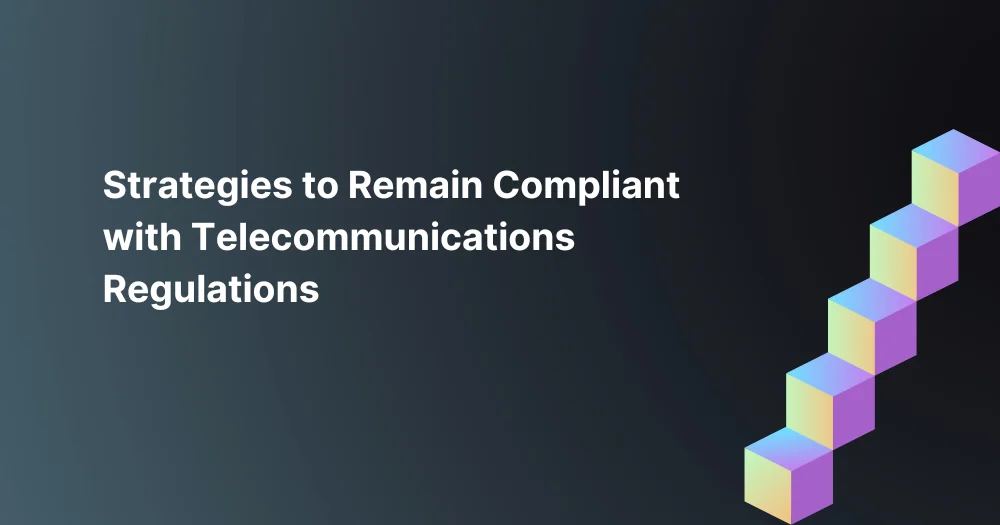
Effective telecommunications regulations promote fairness and transparency in the industry, benefiting consumers and service providers. Although the Federal Communications Commission (FCC) has established telecommunications regulations, many businesses are unaware of them. It is essential to comply with these rules since non-compliance can result in significant penalties and legal action. Therefore, ensuring that your business meets these regulations is crucial. This blog will provide strategies to ensure your business follows telecommunications regulations.
Before discussing strategies for compliance, it is crucial to understand what telecommunications regulations are. Telecommunications regulations are laws and policies that govern the transmission of information and data through various communication channels such as telephone, internet, radio, and television. The FCC is the primary regulatory body responsible for enforcing telecommunications regulations at the federal level.
In addition to federal regulations, many states also have their own telecommunications regulations. Compliance with these regulations can protect businesses from legal and financial liabilities.
A compliance officer monitors the ever-evolving telecom regulations and ensures the business follows all necessary guidelines. The compliance officer can monitor compliance requirements, keep abreast of regulatory changes, and develop compliance policies and procedures. They can also audit and monitor company practices, ensuring employees are trained in compliance policies and procedures. With a designated person in charge of compliance, businesses can stay up-to-date with regulations automatically and avoid falling behind.
But the benefits go beyond simply avoiding penalties. A compliance department should be considered an investment rather than a cost. Compliance officers can help identify inefficiencies and redundancies in telecom systems, creating opportunities for streamlining and cost savings.
Conducting a compliance audit can help identify areas of non-compliance within your business. The audit should identify the areas of non-compliance and outline specific strategies for addressing these areas. A third-party auditor or an internal compliance team can perform this audit.
Documenting compliance policies and procedures is critical to ensuring your business remains compliant. Documented policies and procedures should be followed consistently to meet compliance requirements.
Keeping updated with the latest telecom regulations is critical to ensuring compliance. Staying updated can be achieved through subscribing to newsletters, attending conferences, and participating in professional development opportunities.
Maintaining accurate records and data is critical to demonstrating your business’s compliance. Businesses should retain records of all telecommunications transactions, including telephone calls, internet usage, and data transmissions. These records should be organized and easily accessible.
Training employees in telecom compliance policies and procedures is critical to ensuring compliance. This training should be provided to all employees involved in telecommunications transactions. Employees must have a thorough understanding of compliance policies to ensure that they are followed consistently.
Now that we have outlined strategies for ensuring compliance, it is vital to understand the penalties for non-compliance. Not following regulations could have serious consequences — from hefty fines to legal repercussions to harming your business’s reputation. Failure to follow guidelines can lead to fines ranging from hundreds to millions of dollars, depending on the severity and nature of the violation. The FCC can enforce monetary penalties of up to $200 million per violation. Additionally, individuals found violating rules may be subject to civil or criminal legal action under federal law. State laws may also apply.
Implementing telecom compliance strategies involves:
Building a telecom compliance team helps ensure that compliance policies and procedures are followed consistently. The team should include employees responsible for monitoring compliance, providing training, and maintaining records.
Conducting regular risk assessments can help identify areas of non-compliance within your business. This assessment can be performed by a third-party auditor or by an internal compliance team. The assessment should identify the areas of non-compliance and outline specific strategies for addressing these areas.
Maintaining compliance standards involves ensuring that documented policies and procedures are followed consistently. Compliance standards should be regularly reviewed and updated to align with the latest telecom regulations.
Using data analytics can help businesses identify areas of non-compliance and develop strategies for addressing these areas. Data analytics can identify patterns of non-compliance and help businesses target specific areas for improvement.
Ensuring compliance with telecommunications regulations involves:
Regular self-audits can help businesses identify areas of non-compliance and develop strategies for addressing these areas.
A compliance management system can ensure compliance policies and procedures are followed consistently. This system should include regular training, documentation of compliance policies, and reporting mechanisms for potential compliance violations.
Regular training is another best practice for staying telecom compliant. Businesses should regularly train employees on compliance policies and procedures and be updated on regulation changes. Telecommunications compliance training can be provided in various formats, including online courses, in-person training sessions, and webinars.
Building partnerships with compliant telecom vendors can help ensure your business stays compliant. These vendors should be able to demonstrate a commitment to compliance and should follow all established regulations. Businesses should regularly review vendor compliance records and ensure vendors meet compliance standards.
Compliance with telecommunications regulations is critical for businesses. Businesses can avoid financial and legal liabilities associated with non-compliance by following the strategies and best practices detailed in this article.
BlackPoint IT provides a comprehensive suite of telecom services, including consulting, implementation, migration, optimization, monitoring, maintenance, and 24/7 support. We can help you keep your business in line with the latest telecom regulations to avoid penalties related to non-compliance. Contact BlackPoint IT today and take advantage of our expertise to navigate telecom regulations.